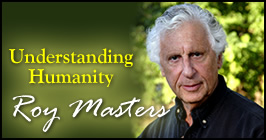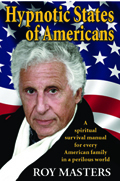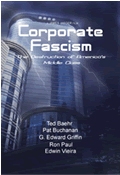PART 2
By
Roy Masters
Author of "Hypnotic
States of Americans"
July 24, 2012
NewsWithViews.com
This article first appeared in the February 1989 issue of New Dimensions magazine.
We tend to think of "conformity" and "rebellion" as opposite forms of behavior. Yet rebellion and conformity, in their usual form, are actually two sides of the same syndrome. Both are responses to pressure which keep the victim reacting to, and therefore "conforming" to, the pressure source. There is a third way of dealing with pressure that involves neither rebellion nor conformity, which allows a person to fully develop his innate potential, without outside interference.
In a sense, it can be said that rebels, criminals, and the insane are specially bred to provide a horror show that distracts the rest of guilty society from the real horrors of its own condition. There is relief and reassurance in the spectacle of others who are worse off than ourselves. We are fortunate and good by comparison, and as we make them worse still by our cruel and hypocritical "help" and punishment, we use them to reinforce our own rebellious, false sense of worth.
There is no human dilemma that does not involve pride and is not complicated by rage. The greater our frustration and resentment, the more far-out, distorted and extreme will our fantasies, aberrations, and madnesses become. Rebellion is pure hell. Tabloid headlines are replete with such horror stories as: 'Teen Goes On Rampage After Mother Asks Him To Make His Bed."
Often we hear of a quiet person, a good student admired by his peers, suddenly going on a murderous rampage. Why is this? The answer is that when a compulsion to please (initially perhaps a right rebellion, gone sour) becomes too painful to bear, it may revert to what it really was all along. And when the compulsion to rebel breeds intolerable feelings of hate and guilt, it may change into a compulsion to conform. You may fluctuate between extremes, going the way you are led for some advantage of the moment, see-sawing between rebellion and conformity. When the cost of rebelling is too high, you can crawl back into favor, hat in hand, by conforming again to the system. Hurt again by rejection or use, you rebel again.
In this world, things are rarely what they seem. More often than not, the person you perceive to be a victim is merely someone getting what he deserves. The poor, innocent, battered wife may well be the real villain—and the one gone berserk, the victim. The hypocritical media almost never report the real story behind the headline. Probably the real story behind 'Teen Goes On Rampage ... " had to do with the way the mother "asked" her son to make his bed. It was probably the sneering contempt, the tone of voice, the insincerity that drove the son over the edge. This is not to suggest that the violent are always innocent, but to illustrate that Frankenstein monsters tend to recreate one another endlessly. Of course, there are psychopaths who delight in what the world has made of them, and delight in making new victims.
But we don't have to be victims. We may learn to overcome resentment and judgment. For a season, some of us are destined to experience total madness—to rebel, to hurt loved ones, to be acted through, to become like the parents we hated and to experience their hell, in our turn being the instrument of harm to our own children. It may be that we could learn in no other way to arrive at compassion for our parents, our children, and ourselves. It may be that we must squander years and inflict much injury, wandering aimlessly through life as a religious hypocrite, as an overprotective mother, a drunken woman chasing a business ex-ecutive, a punk, a gang member, a dope addict, a thief, even a murderer. Some of us are so incredibly stubborn that we have to eat dirt to appreciate steak. Sinking as low as we can go is what it takes to wake us up.
Patricia Hearst's tormentors once left her alone with a car, but she didn't try to escape. On a TV interview she was asked about this and she replied: "I didn't want to believe that anyone could make me do anything." In other words, when her brainwashers left her alone and her chance came, all their implanted suggestions which she had tried so hard to resist had to become her own loyalties. Her ego could not admit she had been subject to others. She had to demonstrate her "freedom" by choosing to stay when she could escape, or else admit to having been under the SLA's control. The same sort of self-deception is practiced by smokers, alcoholics, and drug addicts: "I could stop if I wanted to. It's my choice." The prideful, enslaved ego insists it is free. Once corrupted, it must go on working in favor of the enemy. Over a period of time, Truth becomes the more feared enemy; pride and guilt require us to rebel against conscience rather than against the enslaver, to go on doing evil as if it were our choice. The point is that the fallen soul cannot creatively rebel. Its only hope is to repent of the sin of pride.
Always, tyrants have resorted to terrible cruelty to keep the masses meek and submissive. Do you see why? The more violent the trespass and the more resistant the pride, the more surely will the outcome be surrender and submission.
Realizing how confused and out of control you have always been, perhaps now you can feel compassion for your poor old parents. Maybe your mother is the root of most of your misery and conflict. But look at it this way: Maybe she couldn't help it. Perhaps she was raped, slapped around, or even passed around—a not uncommon story—by a bestial father. Then she had a baby, you, and in her madness couldn't help taking her hatred out on you. A victim herself, she was compelled to make you a victim. And don't overlook your own part: your judgment. It is your resentment of her that keeps you a victim. It's always the same principle. If you realize she couldn't help hurting you any more than you can help hurting others, can you honestly go on resenting her? And what about dear old dad? Did you have a violent father? And are you like him? Face yourself. Aren't you out of control? Seeing this is so, can you honestly go on being resentful toward your father? Can't you see your parents as people without understanding and out of control? Isn't it true that the main part of your prob-lem is an ego-rebellion against realizing your rebellion has failed? Isn't pride the problem, pride that wants to go on being prideful, sustaining itself in its rebellion against God by reacting to and perpetuating evil?
The sin of rebellion against understanding and of doubting oneself is as original as original sin. When our forefather fell from grace and came away from under God's command, he came under the power of Satan and we, his children, have been in bondage ever since, trying to rebel but never succeeding.
You were born a victim. That is your heritage of original sin. There is no escape. Realizing this, you must give up the struggle; otherwise you cannot be saved. You cannot possibly appreciate what your parents have been through. Compassionate realization is blocked by your own judgments. In the heat of your passion and rage you cannot know whether someone enjoys driving you mad or what. Perhaps your mother is doing her best to compensate for the guilt of some indwelling hell. But her "goodness" only offends you and brings out your "badness." You cannot see her private agonizing as she struggles to bring you up right, only to produce the opposite effect. So be careful how you judge her and how you react. You should not judge her at all. Forgive them for they know not what they do.
Maybe it is her hypocrisy that makes you violently rebellious. A typical sugar-coated mother's "request" is: "Honey dear, would you please go to the store for mummy?" Now you know she isn't asking; she is telling you; and if you refuse she will show violent displeasure. But you test her, as if you didn't know (which makes you a hypocrite, too). And you are right on, of course. It makes her mad when you refuse, which was your "right," since she "asked." But she was afraid to order you, for fear you would rebel. And you know all this, and it's such a muddle, that you get mad; everybody goes mad. You can't help yourself. She can't help trying to make you see you are wrong, while you think: "But she is the cause of it!" So you go out and shoot up—maybe the town. The point is that "the beast" is using your mother's or father's form as a vehicle. History is repeating itself through them and you. It is always the same scene, different players.
There it is—this thing mocking you from inside its victim, spewing out its deadly venom. It bites; you react, you judge, you fall. Now you try to rebel against its effect in you, but your rebellion, again based on resentment, fails; and again the evil is evolving in your life through and beyond you, projecting its earthly hell into others.
What does it matter whether this or that person is a willing or unwilling victim? The point is, the beast must be stopped, and to stop it you must become fully conscious of how it operates. Getting you to first judge and then rebel is its number one intent, to the end of entangling you in the no-win system of choices. Your judgment of its wickedness is the trap, its ongoing victory. After one special moment of trauma and seeming triumph, you are doomed to a lifetime of futile rebellion. It knows what provokes you. It knows more about your weaknesses than you may ever know. It uses your rage and your rebellious struggle to rise against it to rise up in you! Understanding, not brute force, is needed for your salvation.
Become, therefore, a true, creative rebel. Deprive the beast of its power, first by realizing how its nature originally entered you through the drama of its cruelty and your judgment of its wickedness. Realize also how you rebelled against seeing your failing, and how foolish it is to resist anything with resentment. Learn to let the temptation to judge pass. Don't resent; don't be afraid of seeing your helplessness. If you can bear this humiliation without resent-ment, it becomes humility and then salvation. Positive choices then appear.
Perceive others as helpless slaves (of sin), emotionally unconscious of their compulsion to harm you. Let them project their barbed darts of cruelty without being tempted to hate them. Overcome their evil with good, and you may awaken them by your example.
| Subscribe to the NewsWithViews Daily News Alerts! |
Your family—wife, husband, mother, brothers or sisters—may go mad or go glad. Either way, the hidden purpose of hell will be bared and defeated where you stand. If anyone de-lights in teasing and degrading you, from now on it is you who has the ultimate advantage. The beast in them is trying to destroy your emerging innocence, trying every way it can to get you to fail through judgment and to struggle in the swamp. Be still and aware and keep your footing, and you will see injustices against you transformed by understanding. Those who would use you, God uses as a foil—a heavenly means to unfold the character of the innocent.
To free yourself from the state where neither rebellion nor conformity helps, you must learn to deal properly, without resentment, to pressures of any kind. My Be Still and Know meditation exercise shows you how to do this and helps you practice remaining in the proper state. You can get a copy at fhu.com or by calling 800-877-3227.
Click here for part -----> 1, 2,
Listen to Roy Masters LIVE call in radio show Monday to Friday from 9 PM to 11 PM Pacific on KDWN Radio in Las Vegas, NV.
� 2012 Roy Masters - All Rights Reserved
Roy Masters—who in his 80s continues to broadcast the longest-running counseling show in talk radio history, his internationally syndicated daily radio program Advice Line, grew up in pre-WWII England. He started his journey toward understanding human nature when as a teen he saw a stage hypnotist at a vaudeville show in Brighton. The hypnotist easily put volunteer subjects in a spell and made them do outlandish things, like dancing with a broom and forgetting their own names.
Puzzled by the hypnotist’s mysterious power, Roy distinctly remembers pondering the question: “Why can’t hypnotism be used to make people act sensibly, rather than foolishly?” Inspired by the idea of harnessing this baffling force for good, he later pursued the art of hypnotism and established a successful hypnotherapy practice.
After several years of practice, Masters made his central and pivotal discovery about the root of people’s emotional problems, addictions and complexes. He realized that people did not need hypnosis, because their core problem was that they are already hypnotized—not by a clever stage performer, but by the stresses, pressures and seductions of daily life.
He used his knowledge to discover a way to help us become de-hypnotized, and discovered that the root of the power of negative suggestion lay in our wrong emotional response, that of resentment. Masters’ remarkably effective exercise, a simple observation technique called Be Still and Know—is at the core of his unmatched track record in helping people overcome even the most serious mental-emotional problems, and is the centerpiece of a successful program within the U.S. military community (“Patriot Outreach”) that is helping thousands of military personnel and their families cope with post-traumatic stress disorder (PTSD).
1-
Website: www.fhu.com
2- Website: FixAnxiety.org











 Share
This Article
Share
This Article





